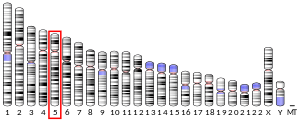GRIA1
Glutamate receptor 1 is a protein that in humans is encoded by the GRIA1 gene.[5][6]
Function
Glutamate receptors are the predominant excitatory neurotransmitter receptors in the mammalian brain and are activated in a variety of normal neurophysiologic processes. These receptors are heteromeric protein complexes with multiple subunits, each possessing transmembrane regions, and all arranged to form a ligand-gated ion channel. The classification of glutamate receptors is based on their activation by different pharmacologic agonists. The GRIA1 belongs to a family of alpha-amino-3-hydroxy-5-methyl-4-isoxazole propionate (AMPA) receptors. Each of the members (GRIA1–4) include flip and flop isoforms generated by alternative RNA splicing. The receptor subunits encoded by each isoform vary in their signal transduction properties. The isoform presented here is the flop isoform. In situ hybridization experiments showed that human GRIA1 mRNA is present in granule and pyramidal cells in the hippocampal formation.[7]
GRIA1 (GluR1) is centrally involved in synaptic plasticity. Expression of the GluR1 gene is significantly reduced in the human frontal cortex with increasing age.[8]
Interactions
GRIA1 has been shown to interact with:
See also
References
- GRCh38: Ensembl release 89: ENSG00000155511 - Ensembl, May 2017
- GRCm38: Ensembl release 89: ENSMUSG00000020524 - Ensembl, May 2017
- "Human PubMed Reference:". National Center for Biotechnology Information, U.S. National Library of Medicine.
- "Mouse PubMed Reference:". National Center for Biotechnology Information, U.S. National Library of Medicine.
- Puckett C, Gomez CM, Korenberg JR, Tung H, Meier TJ, Chen XN, Hood L (October 1991). "Molecular cloning and chromosomal localization of one of the human glutamate receptor genes". Proc Natl Acad Sci U S A. 88 (17): 7557–7561. doi:10.1073/pnas.88.17.7557. PMC 52340. PMID 1652753.
- McNamara JO, Eubanks JH, McPherson JD, Wasmuth JJ, Evans GA, Heinemann SF (July 1992). "Chromosomal localization of human glutamate receptor genes". J Neurosci. 12 (7): 2555–2562. doi:10.1523/JNEUROSCI.12-07-02555.1992. PMC 6575855. PMID 1319477.
- "Entrez Gene: GRIA1 glutamate receptor, ionotropic, AMPA 1".
- Lu T, Pan Y, Kao SY, Li C, Kohane I, Chan J, Yankner BA (June 2004). "Gene regulation and DNA damage in the ageing human brain". Nature. 429 (6994): 883–891. doi:10.1038/nature02661. PMID 15190254.
- Gardoni F, Mauceri D, Fiorentini C, Bellone C, Missale C, Cattabeni F, Di Luca M (November 2003). "CaMKII-dependent phosphorylation regulates SAP97/NR2A interaction". J. Biol. Chem. 278 (45): 44745–44752. doi:10.1074/jbc.M303576200. PMID 12933808.
- Leonard AS, Davare MA, Horne MC, Garner CC, Hell JW (July 1998). "SAP97 is associated with the alpha-amino-3-hydroxy-5-methylisoxazole-4-propionic acid receptor GluR1 subunit". J. Biol. Chem. 273 (31): 19518–19524. doi:10.1074/jbc.273.31.19518. PMID 9677374.
- Sans N, Racca C, Petralia RS, Wang YX, McCallum J, Wenthold RJ (October 2001). "Synapse-associated protein 97 selectively associates with a subset of AMPA receptors early in their biosynthetic pathway". J. Neurosci. 21 (19): 7506–7516. doi:10.1523/JNEUROSCI.21-19-07506.2001. PMID 11567040.
- Shen L, Liang F, Walensky LD, Huganir RL (November 2000). "Regulation of AMPA receptor GluR1 subunit surface expression by a 4. 1N-linked actin cytoskeletal association". J. Neurosci. 20 (21): 7932–7940. doi:10.1523/JNEUROSCI.20-21-07932.2000. PMID 11050113.
- Kohda K, Kamiya Y, Matsuda S, Kato K, Umemori H, Yuzaki M (January 2003). "Heteromer formation of delta2 glutamate receptors with AMPA or kainate receptors". Brain Res. Mol. Brain Res. 110 (1): 27–37. doi:10.1016/s0169-328x(02)00561-2. PMID 12573530.
Further reading
- Sun W, Ferrer-Montiel AV, Schinder AF, McPherson JP, Evans GA, Montal M (1992). "Molecular cloning, chromosomal mapping, and functional expression of human brain glutamate receptors". Proc. Natl. Acad. Sci. U.S.A. 89 (4): 1443–1447. doi:10.1073/pnas.89.4.1443. PMC 48467. PMID 1311100.
- Potier MC, Spillantini MG, Carter NP (1992). "The human glutamate receptor cDNA GluR1: cloning, sequencing, expression and localization to chromosome 5". DNA Seq. 2 (4): 211–218. doi:10.3109/10425179209020805. PMID 1320959.
- Yakel JL, Vissavajjhala P, Derkach VA, Brickey DA, Soderling TR (1995). "Identification of a Ca2+/calmodulin-dependent protein kinase II regulatory phosphorylation site in non-N-methyl-D-aspartate glutamate receptors". Proc. Natl. Acad. Sci. U.S.A. 92 (5): 1376–1380. doi:10.1073/pnas.92.5.1376. PMC 42522. PMID 7877986.
- Eastwood SL, Burnet PW, Beckwith J, Kerwin RW, Harrison PJ (1994). "AMPA glutamate receptors and their flip and flop mRNAs in human hippocampus". NeuroReport. 5 (11): 1325–1328. doi:10.1097/00001756-199406270-00007. PMID 7919190.
- Roche KW, Raymond LA, Blackstone C, Huganir RL (1994). "Transmembrane topology of the glutamate receptor subunit GluR6". J. Biol. Chem. 269 (16): 11679–11682. PMID 8163463.
- McLaughlin DP, Cheetham ME, Kerwin RW (1993). "Expression of alternatively-spliced glutamate receptors in human hippocampus". Eur. J. Pharmacol. 244 (1): 89–92. doi:10.1016/0922-4106(93)90062-E. PMID 8420792.
- Roche KW, O'Brien RJ, Mammen AL, Bernhardt J, Huganir RL (1996). "Characterization of multiple phosphorylation sites on the AMPA receptor GluR1 subunit". Neuron. 16 (6): 1179–1188. doi:10.1016/S0896-6273(00)80144-0. PMID 8663994.
- Brakeman PR, Lanahan AA, O'Brien R, Roche K, Barnes CA, Huganir RL, Worley PF (1997). "Homer: a protein that selectively binds metabotropic glutamate receptors". Nature. 386 (6622): 284–288. doi:10.1038/386284a0. PMID 9069287.
- Barria A, Derkach V, Soderling T (1998). "Identification of the Ca2+/calmodulin-dependent protein kinase II regulatory phosphorylation site in the alpha-amino-3-hydroxyl-5-methyl-4-isoxazole-propionate-type glutamate receptor". J. Biol. Chem. 272 (52): 32727–32730. doi:10.1074/jbc.272.52.32727. PMID 9407043.
- Ripellino JA, Neve RL, Howe JR (1998). "Expression and heteromeric interactions of non-N-methyl-D-aspartate glutamate receptor subunits in the developing and adult cerebellum". Neuroscience. 82 (2): 485–497. doi:10.1016/S0306-4522(97)00296-0. PMID 9466455.
- Leonard AS, Davare MA, Horne MC, Garner CC, Hell JW (1998). "SAP97 is associated with the alpha-amino-3-hydroxy-5-methylisoxazole-4-propionic acid receptor GluR1 subunit". J. Biol. Chem. 273 (31): 19518–19524. doi:10.1074/jbc.273.31.19518. PMID 9677374.
- Xiao B, Tu JC, Petralia RS, Yuan JP, Doan A, Breder CD, Ruggiero A, Lanahan AA, Wenthold RJ, Worley PF (1998). "Homer regulates the association of group 1 metabotropic glutamate receptors with multivalent complexes of homer-related, synaptic proteins". Neuron. 21 (4): 707–716. doi:10.1016/S0896-6273(00)80588-7. PMID 9808458.
- Montague AA, Greer CA (1999). "Differential distribution of ionotropic glutamate receptor subunits in the rat olfactory bulb". J. Comp. Neurol. 405 (2): 233–246. doi:10.1002/(SICI)1096-9861(19990308)405:2<233::AID-CNE7>3.0.CO;2-A. PMID 10023812.
- Leuschner WD, Hoch W (1999). "Subtype-specific assembly of alpha-amino-3-hydroxy-5-methyl-4-isoxazole propionic acid receptor subunits is mediated by their n-terminal domains". J. Biol. Chem. 274 (24): 16907–16916. doi:10.1074/jbc.274.24.16907. PMID 10358037.
- Shi SH, Hayashi Y, Petralia RS, Zaman SH, Wenthold RJ, Svoboda K, Malinow R (1999). "Rapid spine delivery and redistribution of AMPA receptors after synaptic NMDA receptor activation". Science. 284 (5421): 1811–1816. CiteSeerX 10.1.1.376.3281. doi:10.1126/science.284.5421.1811. PMID 10364548.
- Rubio ME, Wenthold RJ (1999). "Calnexin and the immunoglobulin binding protein (BiP) coimmunoprecipitate with AMPA receptors". J. Neurochem. 73 (3): 942–948. doi:10.1046/j.1471-4159.1999.0730942.x. PMID 10461883.
- Stinehelfer S, Vruwink M, Burette A (2000). "Immunolocalization of mGluR1alpha in specific populations of local circuit neurons in the cerebral cortex". Brain Res. 861 (1): 37–44. doi:10.1016/S0006-8993(00)01952-1. PMID 10751563.
External links
- GRIA1+protein,+human at the US National Library of Medicine Medical Subject Headings (MeSH)
This article incorporates text from the United States National Library of Medicine, which is in the public domain.



